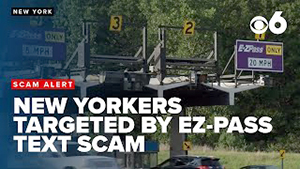|
Getting your Trinity Audio player ready...
|
By: Jordan Baker
New Yorkers are the latest target of a text message scam falsely claiming recipients owe unpaid tolls. The fraudulent messages, appearing to come from E-ZPass New York, urge individuals to make an immediate payment to avoid late fees and direct them to a fake website designed to steal their personal and financial information.
The scam, which began circulating in January and February 2025, has reached both E-ZPass customers and people who don’t even own a vehicle, sparking widespread concern across the city.
The Rise of the Scam Amid Congestion Pricing Rollout
According to amNY, the scam gained traction shortly after the launch of New York’s congestion pricing program on January 5. This controversial initiative, designed to reduce traffic in Manhattan’s Central Business District, has increased public awareness of tolls—creating the perfect opportunity for fraudsters to exploit confusion.
Staten Island resident Andy Cintron was one of the many New Yorkers who received the fraudulent message. “I received one, laughed, and blocked it,” he told amNY. While some, like Cintron, recognized the scam immediately, others have not been as lucky. Social media has been flooded with reports of people receiving the scam message—including individuals who don’t even have an E-ZPass account or own a car.
MTA Warns Customers About the Scam
The Metropolitan Transportation Authority (MTA) has issued multiple warnings about the scam, urging New Yorkers to stay vigilant.
A statement on the E-ZPass New York website reads:
“We have recently learned of an SMS text message scam being presented as an attempt to collect tolls for the Congestion Relief Zone, formally known as the Central Business District Tolling Program. Some of these messages reference ‘NY Toll Services’ while others use different fictitious names. Please be advised this is NOT an authorized communication from E-ZPass or the toll agencies associated with E-ZPass.”
The agency has emphasized that it never requests sensitive information—such as Social Security numbers, bank details, or dates of birth—via text message or email.
How the Scam Works
The fraudulent messages typically follow a pattern designed to induce panic:
You Receive a Text – The message claims you owe a toll payment, often including a specific date and invoice reference number.
A Fake Link is Provided – The message contains a clickable link leading to a fraudulent website.
The Scam Website Requests Personal Details – Upon clicking the link, victims are prompted to enter personal and financial information, such as credit card numbers or bank login credentials.
Funds and Data are Stolen – Scammers withdraw money or use stolen data for further fraud, such as identity theft.
While the messages appear convincing, there are several red flags that can help recipients identify the scam:
Generic greetings rather than personalized account information.
Urgent language, pressuring immediate action to avoid fines.
Slight variations in website URLs, such as “EZPass-NY.com” instead of the legitimate EZPassNY.com.
How to Protect Yourself from the E-ZPass Scam
Do not click on any links in unsolicited text messages. Legitimate agencies do not request payments via random text messages.
Verify directly with E-ZPass New York by calling 800-333-8655 or visiting the official website EZPassNY.com.
Be wary of unknown senders. Scammers often use phone numbers that appear local but are untraceable.
Check the URL carefully. Fraudulent websites often look similar to real ones but may contain subtle misspellings or extra characters.
Never enter personal or financial information unless you are certain the website is legitimate.




